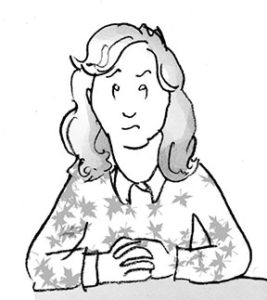 I’ve never liked it when authors and filmmakers treated a character that I liked badly. So it was difficult for me to put Maggie — arguably the sweetest and nicest of the ETC girls — through so much in A Year of Every Tuesday. In some ways, it kept seeming like the natural progression for her — after all, niceness is ultimately a brittle construct. But also, she was the most obvious choice to be the case study for the girls as they reach a new phase of their lives.
I’ve never liked it when authors and filmmakers treated a character that I liked badly. So it was difficult for me to put Maggie — arguably the sweetest and nicest of the ETC girls — through so much in A Year of Every Tuesday. In some ways, it kept seeming like the natural progression for her — after all, niceness is ultimately a brittle construct. But also, she was the most obvious choice to be the case study for the girls as they reach a new phase of their lives.
There were three aspects, then, to Maggie’s problem:
- Family issues
- Beginning to see the world you’ll be launched into
- Unanswered prayer
When ‘Mom’ becomes ‘Mother’
There’s just something about mothers and daughters as the teenage years hit. (You might have noticed that Maggie’s father is relatively oblivious to what’s going on. Not his fault, really; both Maggie and her mother seem intent on keeping him from finding out.)
It’s just the way of things, it seems, that daughters have to challenge their mother’s authority as they grow up. Mothers have to try to combat bad behavior, keep the family running and regain the respect they had. Both mothers and daughters are beset by the usual human array of flaws and foibles. Maggie hasn’t been handling her confusion and frustration well, but Mrs. Peasle certainly showed poor judgment by lying to her daughter and dragging her off to a psychologist when she didn’t want to go.
It’s all just part of what make these years so tough. I loved my family and my mother, but I was difficult at times, to be sure. I kept the worst of my heartaches private, because I didn’t know how to communicate them and thought I would spare others my pain. But too often, when I look back, I feel as though I took out a lot of frustration and resentment on my mother in a lot of stupid little episodes. You outgrow it, if all goes well, but I’m not sure you ever forget it. Some of my friends were much more rebellious than I was; some less. In Maggie’s case, maybe there is something to what her mother says about the sudden drama having to do with adolescent hormones. But in any case, it’s a factor that was bound to hit all of the girls sooner or later.
Future shock
 In the introduction, we were all thinking Maggie-May Peasle was shaping up to be a real brat of a teenager. By the end of the book, we realize that it’s more complicated than that. Making that transition from a child to an adult, she began looking at the world she’d be inheriting, and it made her dread what she was getting into.
In the introduction, we were all thinking Maggie-May Peasle was shaping up to be a real brat of a teenager. By the end of the book, we realize that it’s more complicated than that. Making that transition from a child to an adult, she began looking at the world she’d be inheriting, and it made her dread what she was getting into.
Again, some kids are sensitive this way, and others, not so much. When I was growing up, there were so many big fears being talked about that an ingenious author coined a term for it: Future shock. The biggies I remember were overpopulation and pollution, which I expected to turn our planet into a filthy, overcrowded slum by the time I was in my 30s. And of course there were always horrible stories in the news to make it seem as if the world was a truly evil place.
It was all so dizzying to me, so overwhelming. One minute, I would want to hurry up and be an adult so I could begin to fix things (because I was certain I had all the answers). The next minute it would occur to me that I was leaving my nice family to go out into a befouled madhouse, and then I’d be terrified.
These days, those fears that you’re taught in school only seem to have multiplied or gotten worse. And one of the unfortunate realities of the internet is that even a child will hear shockingly bad news, instantly, from around the world.
I don’t spell out, exactly, what of this was affecting Maggie. But it seems clear, when her friends press her into finally revealing what’s on her mind, that she’s truly frightened. In this haze of a vague terror she can’t talk about, the idea that her mother needs to have a baby was a way to stop time, to turn the clock back. There was something at a deep level that made it seem like the answer to everything, and she grabbed hold of it.
That’s the psychological aspect to Maggie’s problem. But what about how it affects her faith?
When God doesn’t return your calls
In her panic, Maggie turns to God, as any good Christian would. But what happens is one of the hardest things for any religious person to have to learn — just because you belong to the “right religion” (because everyone thinks theirs is the “right religion”) and just because you are a good person who tries hard doesn’t mean that God will give you what you want when you want it. We know that, if we’ve been decently instructed in our faith. We know that Christianity isn’t just a quid pro quo — give God praise and He’ll give you stuff and fix things. That kind of thing really makes God more of a genie than the God of Abraham and Jacob, and we all know how capricious genies are.
So we know better than to just wish for things and call that prayer, but to have to find it out when you are in a complete panic is still a hard lesson to learn.
Maggie doesn’t seem able to handle it. She makes her case to her mother, and it goes badly. She asks her friends for help, and they turn her down. But rather than seriously consider that she might be wrong, Maggie prays to God for the outcome she wants. She prays for months and months and her immature faith is put to a hard test.
Because God isn’t answering her prayer.
If we remember what she said back in the baptism story, Maggie’s faith was tied up in her family — in things just looking right and feeling so right that they seemed to her like clear evidence of a loving God. Those were the underpinnings of her faith. But then, what if that God doesn’t come when you call or accede to your demands — even if you really, really know you’re demanding for the right thing? What if instead of giving you what you want, God asks more from you?
That’s when childish faith dies and, hopefully, something else rises in its place that is stronger and more resilient. That’s when the real love for God can begin — once the belief in Him as a genie dies.
I’ve been wrestling with this through some ongoing shocks in our household, and it continues to be hard for me. But what can you do? I think often of Peter’s answer, when Christ asks the disciples if they will get offended and leave Him, as so many of the crowd did. Peter says, “Where would we go? You have the words of life.”
Two short sentences, made up of monosyllabic words. But it’s true. So does Maggie begin to come to that new and better place?
Maybe, a little. I left that uncertain for now. When Maggie talks with Abigail, it’s with a certain wistfulness for the rock-solid faith that Vanessa and Abigail have found. It may be something that will take longer for Maggie to find. But at least she was able to unburden herself at last and know that she had four friends to make the journey with, no matter what the future holds.
 The end
The end
So there it is. I hope you enjoyed A Year of Every Tuesday. My plans are to have the next book in the series ready by Lent of 2019 (which starts March 11).
In the meantime, I hope that if you liked the book, you’ll consider writing a review (or even just clicking the one- to five-star rating) on Amazon or Goodreads.
As always, thank you so much for following the series. Abigail, Vanessa, Maggie, Xenia, Photini and I all appreciate it.